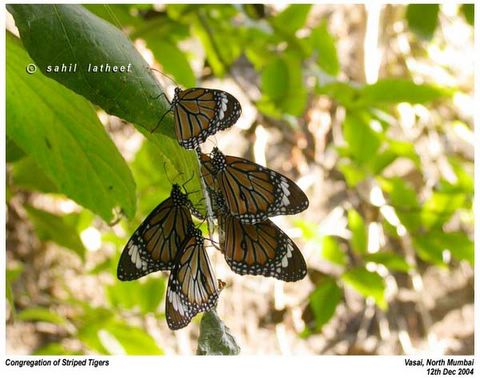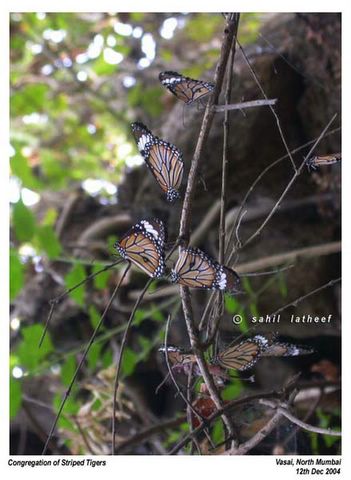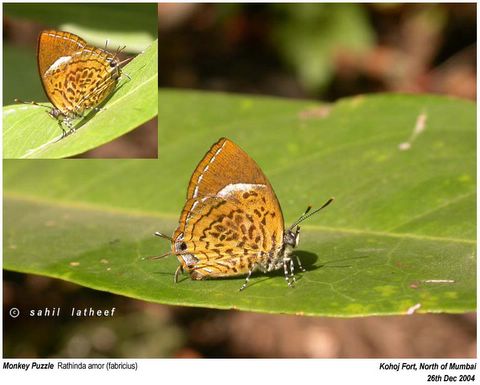
Sunday, December 26, 2004
Some wonders of the Kohoj Fort
This inhabitant of dense jungles flies low down, takes weak and short flights. Generally seen along forest paths and clearings.


I owe big time to this fellow, I have started taking notice of Dragonflies because of him.


This Dragon has been identified by Mr.K.A.Subramanian
(LAB#23, National Centre for Biological Sciences, GKVK, Bellary Road, Bangalore-560 065)
In fact he is using this photo in his upcoming book on Indian Dragonflies
Found these Painted Grasshoppers feeding on the Giant Milkweed (Calotropsis gigantea). This common shrub can grow into a small tree and produces profuse milky latex and is the food plant of the Plain tiger Butterfly as well.
The presence of this plant in the diet of these insects makes them poisonous to there predators.
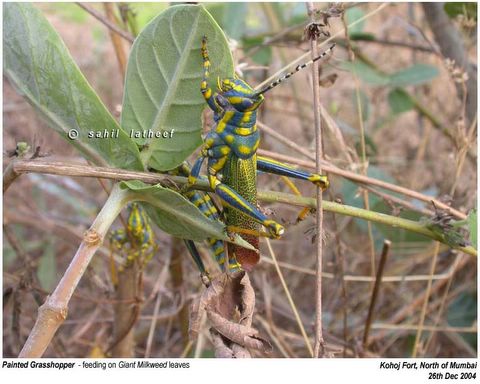
The presence of this plant in the diet of these insects makes them poisonous to there predators.

Sunday, December 12, 2004
Butterfly fort
Sunday, December 05, 2004
Birding @ Uran
Uran didn't fail to amaze yet again - though the water levels
were much lower since my last visit there on the 31st of October.
We (Pragya and myself) were at the pond in front of JNPT Colony Police
Station a little past 7AM on Sunday the 5th of December, to find a
landscape that I would have probably only imagined in Bharatpur (see photos
attached below). We were welcomed by a small group of Ducks, Grey
Herons and Great Egrets, but a closer look thru the binocs a surprise
awaited us in a pair of Comb ducks. Further on, in the pond where we
had earlier spotted the strangler White Pelican, there was a large
group of Pied Avocets (at least 53 nos.) as we were trying to sink in
our first sighting of these wonderful birds a local fisherman walked
straight into the pond and flew them all away. We had to then settle
for the Sand pipers, Shanks, Terns and a few Eurasian Spoonbills (seen
flying overhead).
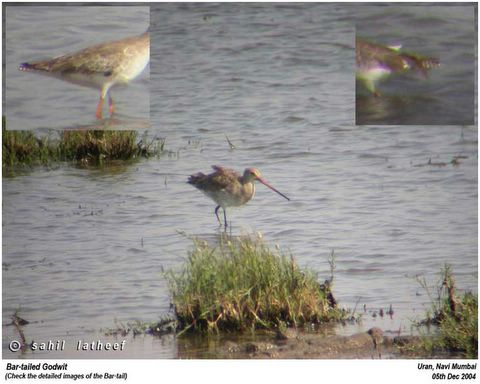
were much lower since my last visit there on the 31st of October.
We (Pragya and myself) were at the pond in front of JNPT Colony Police
Station a little past 7AM on Sunday the 5th of December, to find a
landscape that I would have probably only imagined in Bharatpur (see photos
attached below). We were welcomed by a small group of Ducks, Grey
Herons and Great Egrets, but a closer look thru the binocs a surprise
awaited us in a pair of Comb ducks. Further on, in the pond where we
had earlier spotted the strangler White Pelican, there was a large
group of Pied Avocets (at least 53 nos.) as we were trying to sink in
our first sighting of these wonderful birds a local fisherman walked
straight into the pond and flew them all away. We had to then settle
for the Sand pipers, Shanks, Terns and a few Eurasian Spoonbills (seen
flying overhead).

At our next stop, the pond near the Training centre, there was a largeno. of ducks � Coots, Lesser Whistling Ducks, Garganey Teals, LittleGrebes and a few Unidentifiable Ducks.And at our final halt at a pond near the flyover we spotted a fewBlack winged Stilts, Bar tailed Godwits, and a group of EurasianCurlews (at least 15nos.). I've been told by our dear friend - Addithe Birdie - that such a large group of this species is quiet uncommonnear Bombay.

One more image of the pond near the Police Station

One more image of the pond near the Police Station
Subscribe to:
Comments (Atom)
